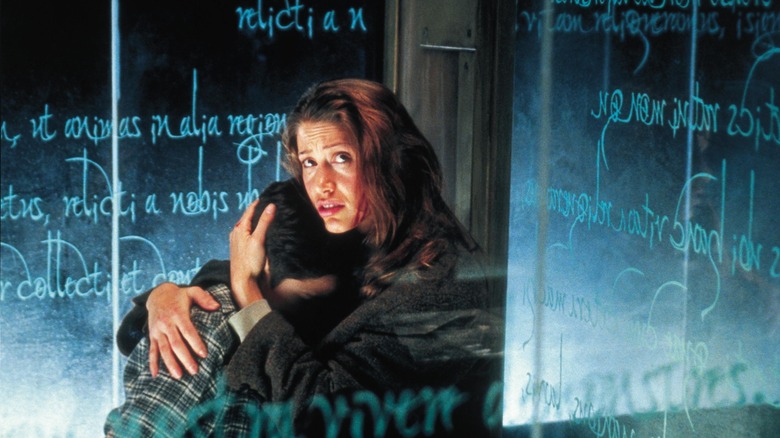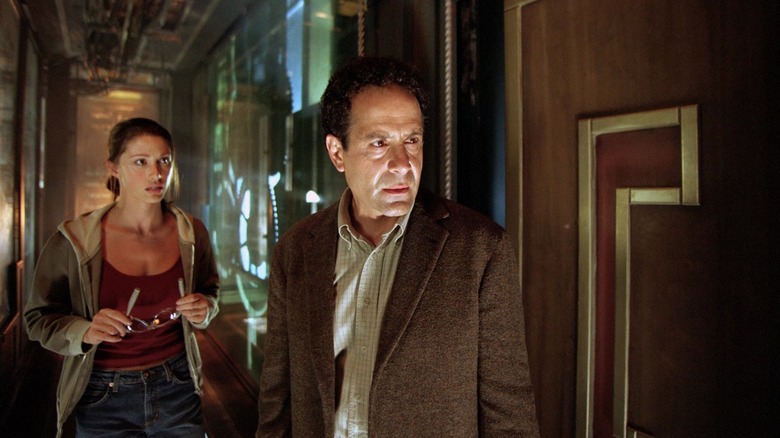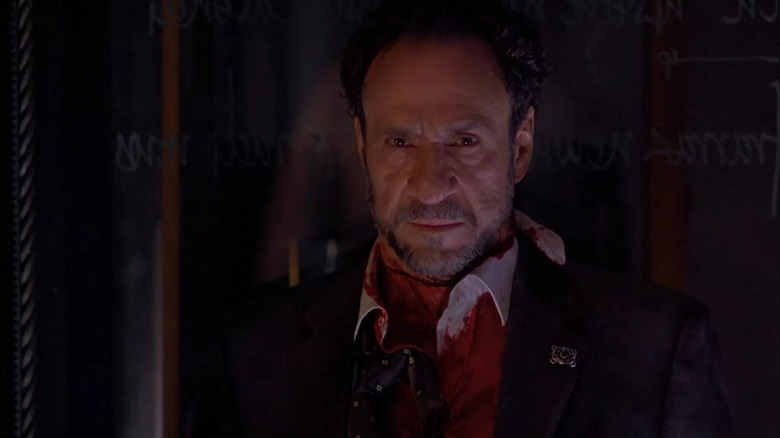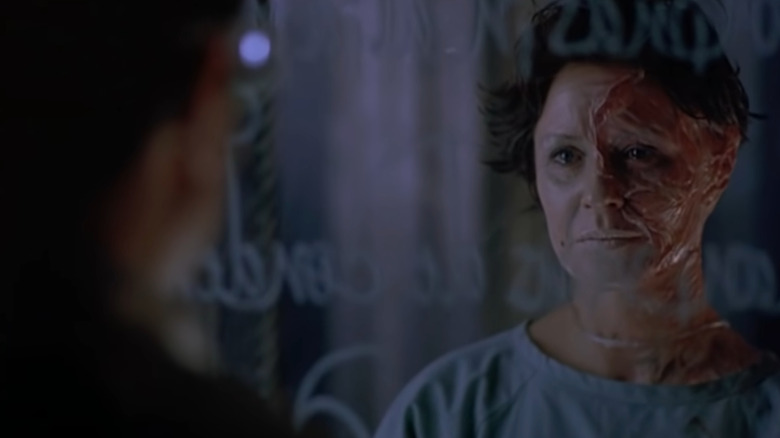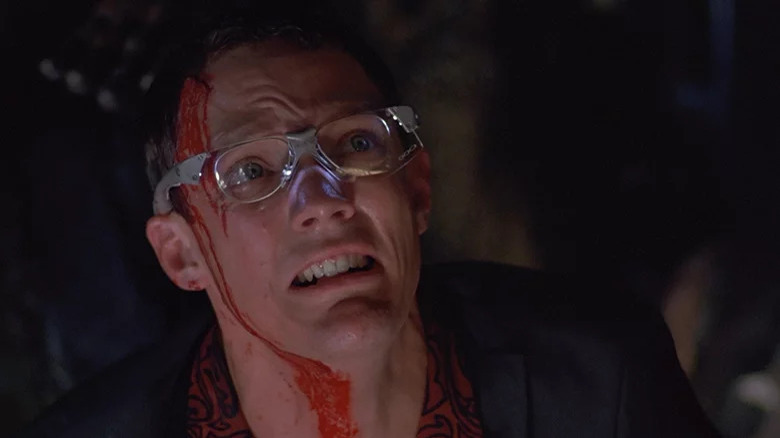Thirteen Ghosts Ending Explained: Love Conquers All — Even Death
The 2001 cult classic horror remake "Thirteen Ghosts" has a dedicated following for a reason: it's a brutally nasty, deeply creative horror film that creates its own unique mythology and utilizes it to tell a surprisingly heartfelt story. The movie follows bereaved widower Arthur Kriticos (Tony Shalhoub) and his family after he inherits a mysterious mansion from his ghost hunter uncle Cyrus (F. Murray Abraham). Unfortunately for Arthur, the mansion is absolutely murderous.
The end of the film pulls each of the 12 ghosts trapped within the mansion together for a bizarre ritual to make Cyrus immortal that requires the titular thirteenth ghost to work — but things don't go as planned for crafty ole' Cyrus and he's torn apart by the very souls he was going to sacrifice. It's seriously satisfying, especially after the full cruelty of Cyrus' plan is revealed in the third act and the audience realizes why he gifted the mansion to Arthur in the first place.
The real draw of "Thirteen Ghosts" is — you guessed it — the ghosts. The movie delivers on not only gross and gory ghost makeup, but also haunting backstories for each that make them more interesting than the average poltergeist. There's a whole lot going on in "Thirteen Ghosts," but that's part of what makes it one of the best horror remakes of its era.
What you need to remember about the plot of Thirteen Ghosts
After Cyrus is apparently killed while capturing the 12th ghost needed for his immortality machine, the Juggernaut (John De Santis), his nephew Arthur inherits his mansion and moves in with his two children, Kathy (Shannon Elizabeth) and Bobby (Alec Roberts), and their nanny Maggie (Rah Digga). The mansion is actually an elaborate prison for the 12 special ghosts that Cyrus has been collecting, with spells written on its glass walls that keep the ghosts contained until they're needed. Cyrus's former assistant, Dennis (Matthew Lillard), tries to warn the family, but they end up triggering the house's self-seal system and letting the ghosts loose anyway. Arthur realizes that his dead wife, Jean, is trapped as one of the ghosts, but they don't exactly get a chance to chat.
Both of the children are kidnapped after they encounter the ghosts and the family's lawyer is killed by a sliding glass panel, sending the remaining adults into a bit of a panic. That's when they meet a spiritualist out to free the ghosts, Kalina Ortezia (Embeth Davidtz). She explains Cyrus's machine to them and tells them that the only way to stop it is with a sacrifice of love, creating the final ghost.
The adults use special "spectral glasses" that help them see the ghosts and survive their violent attacks, and for a while it seems like they might not have any major issues rescuing the kids. Unfortunately, a twist reveals that Kalina is actually Cyrus's secret lover, and he faked his death in order to lure Arthur to the mansion. Things are looking bad for the good guys, but then there's a rather surprising sacrifice.
What happened at the end of Thirteen Ghosts?
Dennis and Arthur are headed to the basement to rescue the kids, but the ghosts are hot on their trail and Dennis sacrifices himself to make sure Arthur can save his family. It's a bummer because it's hard not to root for Lillard's character to make it to the end after a bit of a redemptive arc. Cyrus ends up killing Kalina because she doesn't like the fact that he's using the children as bait, and then Arthur and Cyrus get to have their uncle-nephew showdown. The kiddos are trapped at the center of the immortality machine, which is like a giant whirling clock with metal circles whipping around at high speeds.
The 12 captured ghosts, each corresponding to a different part of the film's dark zodiac, are in a circle around the edge of the machine, held in its power. Maggie starts messing with the machine's control mechanism and frees the ghosts, who turn on their captor. They launch Cyrus into the whirling parts and he's diced to pieces, but then the machine starts spinning out of control. Arthur jumps through the rings to guard his children with his body as the machine explodes, shattering the glass panels of the house and freeing the ghosts, including Jean. The family and Maggie leave the wreckage of the house — and that's "Thirteen Ghosts"!
Different shows of love
There's a lot of "love conquers all" energy in "Thirteen Ghosts," but it's not just Arthur's love for his children that saves the day. There's Maggie's love, of course, but there's also the love Arthur and the kids have for Jean, whom they clearly miss, and her love for them. She tries to protect them from the violent ghosts in the mansion, though there is only so much she can do as just another one of the trapped spirits. If the machine hadn't destroyed the glass, Arthur and the kids may have done it themselves in order to free poor Jean. Arthur is nothing like his uncle Cyrus, so desperate for immortality that he captured his nephew's dead wife's ghost and set a trap to make Arthur sacrifice himself to save his children. He would sacrifice it all for the kids in a second, but he doesn't have to thanks to Maggie and the ghosts, including Jean.
The other person who makes a real sacrifice is Dennis, who clearly wants to help the family and stop his evil former employer. He's always been something of a coward who bent beneath Cyrus's will, but over the course of the movie he starts really sticking up for what's right, even when it comes at the greatest expense.
What's with the spectral glasses?
So what's the deal with the goofy-looking goggles that help the living characters in "Thirteen Ghosts" see the ghosts? Not only do they allow for some fun moments where the audience can only see what the characters see, but they're also a neat little nod to the original 1960 William Castle film that "Thirteen Ghosts" is loosely based on. Castle was known for releasing films with gimmicks like vibrating theater seats and "magic" coins, and for "13 Ghosts," he released the film in "Illusion-O." Each movie-goer was given a card with blue and red cellophane, similar to 3-D glasses of old but meant to be used one color at a time. The movie was released in black and white but used blue and red filters while filming to make the ghosts "appear" or "disappear" depending on which piece of cellophane the viewer looked through.
Having the characters in "Thirteen Ghosts" wear goggles that let them see the ghosts is a pretty fun way to make Castle's big gimmick a part of the remake, without trying to do the same exact thing Castle did.
